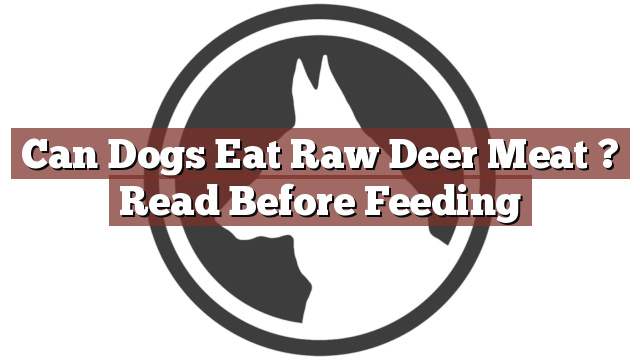Understanding Your Dog’s Dietary Needs
As a responsible pet owner, it is essential to understand your dog’s dietary needs to ensure its overall health and well-being. While dogs are primarily carnivorous, their diet can also include some plant-based foods. Providing a balanced diet that meets all their nutritional requirements is key.
Can Dogs Eat Raw Deer Meat? Read Before Feeding
Can dogs eat raw deer meat? This is a question many dog owners may have when considering alternative food options for their furry friends. The answer is yes, dogs can eat raw deer meat. Dogs are natural hunters, and their ancestors, wolves, would consume raw meat as their primary source of nutrition. Therefore, including raw meat in a dog’s diet can be seen as a reflection of their ancestral diet.
However, it is vital to exercise caution before feeding raw deer meat to your dog. Wild game, such as deer, may carry parasites, bacteria, or diseases that could be harmful to dogs if consumed raw. It is crucial to ensure that the meat is sourced from a reliable and reputable source, free from any potential contaminants. Additionally, consulting with a veterinarian is highly recommended to assess your dog’s specific dietary requirements and ensure that raw deer meat fits into its diet.
Pros and Cons of Feeding Raw Deer Meat to Dogs
Feeding raw deer meat to dogs comes with its own set of pros and cons. On the positive side, raw deer meat is a great source of protein, essential amino acids, vitamins, and minerals. It can contribute to a shiny coat, strong bones, and overall good health for your dog. It also allows for a more natural and varied diet, which can be beneficial for dogs with certain food sensitivities or allergies.
However, there are also potential risks associated with feeding raw deer meat. As mentioned earlier, wild game can carry parasites, bacteria, or diseases that can be harmful to dogs. Proper handling, storage, and preparation are paramount to mitigate these risks. It is also important to note that the diet should be balanced with other nutrients to ensure all of the dog’s nutritional needs are met. Feeding raw deer meat alone may not provide all the necessary vitamins and minerals required for optimal health.
In Conclusion: Consider Your Dog’s Health and Safety Before Feeding Raw Deer Meat
While dogs can eat raw deer meat, it is crucial to prioritize their health and safety. Before incorporating raw deer meat into your dog’s diet, consult with a veterinarian to ensure it aligns with your dog’s specific dietary needs. Choose high-quality sources, handle and store the meat properly, and take necessary precautions to eliminate any potential risks. A balanced diet that includes a variety of foods is key to providing optimum nutrition for your furry friend.
Thank you for taking the time to read through our exploration of [page_title]. As every dog lover knows, our furry friends have unique dietary needs and responses, often varying from one canine to another. This is why it's paramount to approach any changes in their diet with caution and knowledge.
Before introducing any new treats or making alterations to your dog's diet based on our insights, it's crucial to consult with a veterinarian about [page_title]. Their expertise ensures that the choices you make are well-suited to your particular pet's health and well-being.
Even seemingly harmless foods can sometimes lead to allergic reactions or digestive issues, which is why monitoring your dog after introducing any new food item is essential.
The content provided here on [page_title] is crafted with care, thorough research, and a genuine love for dogs. Nevertheless, it serves as a general guideline and should not be considered a substitute for professional veterinary advice.
Always prioritize the expert insights of your veterinarian, and remember that the health and happiness of your furry companion come first.
May your journey with your pet continue to be filled with joy, love, and safe culinary adventures. Happy reading, and even happier snacking for your canine friend!

